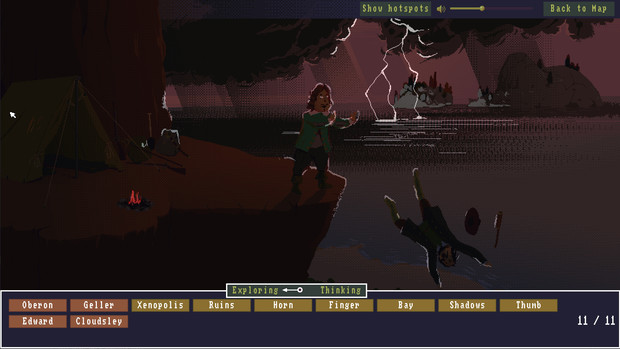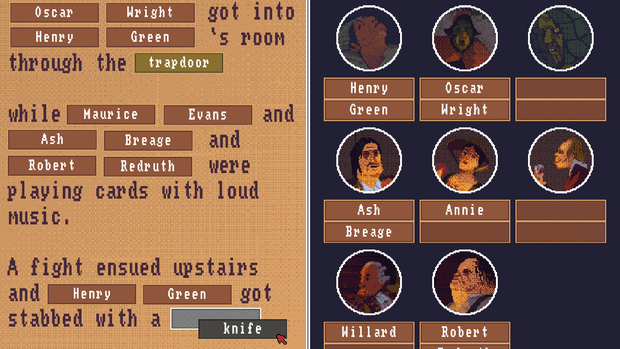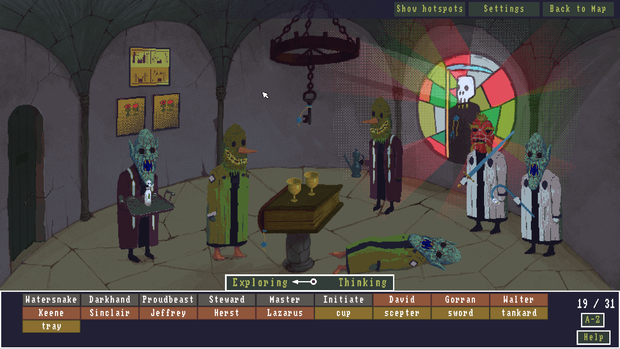The Case of the Golden Idol review

- 0 Comments
Brilliantly executed deduction game like Mad Libs meets Return of the Obra Dinn
When Return of the Obra Dinn released in 2018, capturing the hearts of gamers everywhere with its innovative murder mystery mechanics, it seemed only a matter of time before an “Obra Dinn-alike” would hit the scene and give players more of what they clamored for.
With The Case of the Golden Idol, we’ve gotten just that: another framework built around a series of mysterious deaths from moments frozen in time. Mechanically, the similarities between the two are immediately obvious, but to call this game a copycat would be to miss almost everything that sets it apart and makes it so thoroughly exceptional. Golden Idol carves out its own deeply unique and utterly creative niche, and could very well take the crown for 2022’s best adventure game. It’s been a very, very long time since a game has tickled my brain this much.
Like Obra Dinn, Golden Idol presents a series of grisly events, each with minimal context, and challenges players to use clues within the surroundings to deduce the identities of those present. Going several steps beyond Obra Dinn’s “who died and how” gameplay loop, Golden Idol also asks players to piece together motives, backstories, and occasionally answer esoteric questions about secret societies and how they function within the game’s larger-than-life 18th century setting.

Fascinatingly (and unlike pretty much any game I’ve ever played), Golden Idol puts you in the role of a characterless, omniscient observer. You’ll be solving mysteries to advance the overarching story tying everything together, but your deductions will never be acknowledged by other characters within the story, nor will you have any impact on the events. It’s another similarity to Obra Dinn, where you feel less like a part of the tale and more like a time-travelling voyeur from the future, but even Obra Dinn came up with a narrative that explained your character’s presence and who they were. Here in Golden Idol, the player’s existence is perhaps the biggest mystery of all. And frankly, it works just fine to leave that unanswered.
Gameplay unfolds in two different interfaces: “Exploration” and “Thinking.” While exploring, you’ll view a scene in the immediate aftermath of a murder, clicking on hotspots to rifle through (almost) anyone’s pockets and read any notes they have. Sometimes a case exists all within a single screen, and sometimes they’ll extend out to several linked areas. Rather than picking up items, you’ll be building up a collection of key phrases, which get added to your inventory by finding underlined words in books, letters, signage, and dialogue bubbles. When you’re in the thinking mode, the screen is filled with what looks like an elaborate set of Mad Libs: a fill-in-the-blank mystery that requires you to drag the words you’ve found – nouns, names, verbs and all – into the appropriate places to correctly summarize the ghastly events.
It’s novel, weird, and utterly delightful. In addition to the main mysteries needing their blanks filled, each scene has additional panels within the thinking screen that you can flesh out to shed additional light on the events that occurred. These side objectives aren’t mandatory to advance, but solving them usually gives you information that’s highly relevant to the main story (resulting in a useful clue for the current scene or another one a little further down the line), so it really pays to be a completionist here. Plus … with a mechanic this fun, why would you pass up the chance for more?
You can play with hotspots visibly highlighted or not. Having visible hotspots is the developer’s recommended way to play, and it is a godsend. Honestly, I can’t imagine choosing to go without. Not only do you get a helpful little sparkle effect on any area of interest on the screen, but each sparkle will change color after you’ve clicked it, making it easy to keep track of the clues you’ve already seen … which is very handy, considering the sheer number of them. If you’re the sort of masochist who wants extra challenge, you can turn this off, but The Case of the Golden Idol is plenty difficult enough even without that layer of tedious pixel hunting.

You can also use the mouse wheel to zoom in on a scene and pan around in close-up view, although I didn’t find this particularly necessary – and panning was a little bit too finicky for my liking. Alternatively, Golden Idol sports a perfectly functional control scheme for standard game controllers, which makes better use of the zoom system. Even though this feature remains very much optional to solve any of the mysteries on a sufficiently sized monitor, it could be very handy for those who are visually impaired or playing on something with a small screen like a Steam Deck.
Now, I’ve said this is “Game of the Year” material (and I’ll gladly say it again), but it’s not completely smooth sailing. This is nitpicky territory, but a few grammatical issues mar the presentation a tad. One tutorial message states, “When a scroll is completely filled in, words can be dragged directly the slots.” Um, I think you accidentally a word there, Golden Idol. More troublingly, a rare grammar issue will crop up when filling in the case summary scrolls that needlessly obfuscates the solution. It didn’t prevent me from solving the puzzles, but it did make me second-guess some of my deductions because dragging the correct phrase into the scroll didn’t always make for perfect grammatical syntax. It’s a minor issue, though, and hopefully one that’s easily fixable in a patch.
To make matters easier, there are a few much-appreciated features that will gently guide you to victory. As you fill in the scrolls on the Thinking panel, the game lets you know if you’re wildly incorrect, or only a couple words off. Through process of elimination, you can drag words in and out until you’ve narrowed down the blanks you still need to fix, which allows players who get things “mostly right” to still progress, albeit through a bit of brute-forcing.
If you’re really stuck, there’s an excellent built-in hint system, too – and it doesn’t feel at all like cheating. The hint system has a fun gimmick, in that it’s only accessible after you’ve solved a slightly tedious “match the words to the items” puzzle each time you need it, to discourage overuse. I managed to solve just over half the cases without resorting to any hints, and for the few I needed them, the game would point me in the right direction without ever spelling out the solution. The only exception was a particularly complicated case where even the hints didn’t shed much light on things, and I sadly needed to look up the solution elsewhere to proceed.

Some scenes are solvable purely from the information currently present on-screen, while others require you to remember key details from previous scenes to piece together identities and motives (or go back and revisit them if you’ve forgotten). Sometimes events in previous scenes have major payoffs in the logic of later ones, and I frequently marveled at the ingenuity of the developers for even thinking of the wild concepts on display – while also giving myself a pat on the back for following the clues just well enough to figure them out. Without getting into spoilers, I’ll simply say that the story spans decades, and quite a few characters will change their names and appearance in ways you might not expect. Figuring out how (and why) provides some of the most satisfaction the game has to offer.
Making progress in The Case of the Golden Idol will make you feel like a genius … at least until it smugly revels in your gullibility to fall for its numerous misdirections. There are red herrings aplenty, with tons of words that never factor into the solution (which grow in number as the game progresses), plus the dastardly murderers may attempt to cover their tracks by framing someone else, in increasingly crafty ways. It’s so much fun to think you’ve got the mystery all figured out, only for a new piece of evidence to surface and throw your theory into a completely different direction.
As much as I enjoyed the story and mechanics, it’s the music and auditory atmosphere that elevates the experience to a whole new level. Each scene sounds positively sublime. Haunting, cozy, menacing, and charmingly off-kilter, the audio team has concocted a foreboding masterpiece, full of discordant harpsichords and ominous strings. It was occasionally tempting to just sit back and soak in the ambience.
I was also pleasantly surprised by the game’s old-school visuals. When looking at screenshots before playing, I wasn’t terribly won over by the aesthetic, but screenshots don’t do it justice. In the numerous scenes, which feel a bit like animated tableaus, characters sway or waggle about in brief, lively loops of motion, which are very fluidly animated despite the somewhat lo-fi pixel aesthetic. The locations within these tableaus are a lot of fun, too. The game opens on a gloomy cliffside betrayal before diving into an array of fascinating locales, including an abundance of manors, an eerie inn, and the catacombs of a twisted cult. One of my favorite mysteries mixes an aristocratic dinner party (gone very wrong) with domestic intrigue amongst the servants. If you’ve ever felt that Downton Abbey could have really done with a nice helping of ritualistic assassination, well, you’ve found your game!
Golden Idol is a technical champ under the hood, with no bugs in my playthrough and speedy load times. In fact, it launches and loads so quickly – complete with skippable company logos, how nice! – that you can go from clicking “Play” on Steam to clicking around a murder scene within five seconds. I’m not kidding, I timed it. In our world that shifts ever toward instant gratification, this is pretty awesome.
The overarching mystery’s a doozy, and the grandest feather in the game’s cap. Without giving anything away, the eponymous golden idol lies at the heart of a vast conspiracy, weaving familial backstabbing, political intrigue, and pagan horror into a weird and very compelling tale that stuck with me long after I finished playing. The idol itself is a fascinating conceit: a cursed artifact that serves as both a miracle of science (well, perhaps very supernatural science) and a highly deadly weapon, with more and more details about its origins and nature revealed throughout the story as you go. Figuring out how the darn thing works was fascinating, even though much of it can be chalked up to inexplicable magic.
Everything culminates in one final, giant mystery (that will likely require a fair bit of backtracking to previous scenes for clues), and wraps up with an unexpected but highly enjoyable conclusion after around six hours of play … and then hits you with another post-credits epilogue puzzle that reveals even more layers of this absolutely splendid onion.
Final Verdict
There aren’t many games quite like The Case of the Golden Idol. Actually, I’d go as far to say that there’s none … and that makes me a little sad, now that I’ve been so thoroughly spoiled and the bar’s been raised so high. I came into this game hoping for an experience that could go toe-to-toe with Return of the Obra Dinn, and came away having played something that fully scratched that itch while being entirely its own thing. I wholeheartedly hope that the developers of this magnificent work (or heck, even wannabes of similar caliber) do their best to make a follow-up, because oh, how I’ll gleefully soak up every moment.
Hot take
A rip-roaring mystery epic that lingers with you long after it’s over, The Case of the Golden Idol is probably the best combination of murder mysteries and Mad Libs one could ever hope for.
Pros
- A spellbinding, rich, and rather spooky overarching story
- Art style and soundscape build a terrifically immersive atmosphere
- Creativity spilling out of every pore
- Helpful (and optional) method of hotspot highlighting
- Mysteries that make you feel absolutely brilliant when you get them right
Cons
- Some scenes feel just a little too brutally difficult for their own good
- A few grammatical errors add unnecessary confusion
Sean played The Case of the Golden Idol on PC using a review code provided by the game's publisher.










0 Comments
Want to join the discussion? Leave a comment as guest, sign in or register in our forums.
Leave a comment